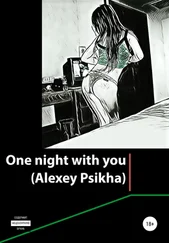I was tempted to take offense, to think it was me she was rejecting, our whole shared past in Cuipas. I was tempted to slip back into that same old envy for how easily Nemecia had let those years drop away from her, leaving me to remember her stories. But by then I was old enough to know that she wasn’t thinking about me at all.
Nemecia spent the rest of her life in Los Angeles. I visited her once when I had some vacation time saved, in her long, low house surrounded by bougainvillea. She collected Dolls of the World and Waterford Crystal, which she displayed in glass cases. She sat me at the dining room table and took the dolls out one by one. “Holland,” she said and set it before me. “Italy. Greece.” I tried to see some evidence in her face of what she had witnessed as a child, but there was nothing.
Nemecia held a wineglass up to the window and turned it. “See how clear?” Shards of light moved across her face.

LAST NIGHT MONICA VIGIL-RIOS HAD LAIN AWAKE, LISTENING to the wind whip across the salt flats and buffet the trailer, imagining intruders with dark intentions outside. They were living in a piece of aluminum foil, Monica thought. That paltry lock wouldn’t withstand a can opener.
And so, as if in retaliation for her ingratitude, the trailer’s heater stopped working. Monica awoke at dawn to seven-year-old Cordelia whimpering from the loft above the dinette. “Mama,” Cordelia said, still half-asleep. “It’s cold.”
“Goddamn it,” said Monica. It was like a scene out of Dickens, she thought: her very own Little Dorrit, failed once again by her feckless parent. An unpleasant rush of guilt came over her, followed by a prickling irritation at Cordelia for causing this guilt, followed, predictably, by a fresh surge of remorse.
It was cold, a dry hopeless cold that made Monica gasp when she slid out of her sleeping bag on the foldout sofa.
“Come on, sweet pea.” She helped the shivering Cordelia down from the loft and tucked her into her own warm bed beside the baby, who was still blissfully asleep, cheeks chilled and pink, the skin at her nose and mouth raw and crusted. “You snuggle close to Beatrice. She’ll be your own personal heater.” Monica slipped on her jacket, wincing at the icy lining, and pushed out into the wind to see what could be done about the furnace.
If only the heat had held on just one more day. Elliot was due back tonight. He’d been away for a week with the car and his rock pick, collecting soil samples, his thoughts locked on some million-year-old landscape only he could see. God, she hoped he’d found what he was looking for.
“I’ll be afraid here all alone,” she’d told him before he left, meaning, “I’ll miss you.”
“Of course you won’t,” he’d said kindly, and they’d all waved as he pulled away, Cordelia shouting to her stepfather, “Goodbye, Elliot! Goodbye!” until the dust settled. As the week progressed, Monica had found herself increasingly lonely, and though she’d read endless stories and done cooking projects and kept chipper for the girls, she’d never felt so stuck or at such loose ends.
Now Monica was furious with Elliot for leaving her stranded, furious with him for not finishing his fieldwork months ago, when he was supposed to. “I was out there for hours,” she imagined telling him, though she never would. “I had to leave the girls unattended.”
When she finally located the furnace on the rear of the trailer, the panel, of course, had to be screwed off, so Monica went back inside to rummage through Elliot’s tools in the greasy storage space under the bench seat. After rejecting several Phillips-head screwdrivers, she finally found a too-small flathead she would have to make work.
Monica went through these motions knowing all the while that once she finally managed to remove the panel, she would have no idea how to begin to repair the furnace. Still, she felt compelled to stay outside as the wind slashed at her face and hair, the screwdriver almost too frigid to hold, stabbing away at the edge of the aluminum panel (which had, it seemed, rusted itself stubbornly in place), as if locating the problem were somehow the same as fixing it.
The sun peered weakly over the Spring Mountains and the salt flats glowed a faint orange. From where she stood, huddled against the trailer, Monica could hear the sign out on the highway, which had come loose from one of its posts and flapped in the wind, a violent, incessant popping. Years from now, Monica thought bitterly, when she looked back on this time in her life, the sign with its faded palm tree is what she’d remember. WELCOME TO FABULOUS GYPSUM!
Fabulous Gypsum! was all exposure and dust, wind and bleak, pale sky, and, at least until Elliot finished the fieldwork that would form the basis of his dissertation on the Death Valley fault system, it was home. The Shady Lanes RV Park was three miles from the town, which was comprised of a school, a post office operating out of a sun-bleached single-wide, and a grocery store with its wall of clanging slot machines. The Lucky Token, the store was called, as if gambling were the necessity and food an afterthought. Faint mountains ringed the horizon, and the cracked flats stretched into the distance, punctuated only by creosote and desert needle.
Finally, Monica gave up on the furnace. Inside, she rejoined the girls in bed, trying to get warm, then fell into a deep sleep until Cordelia stirred beside her. “Shit,” said Monica, glancing at her watch. “Shit, shit, shit.” They were late; already the schoolbus, half-filled with shaggy-headed blond children from the outlying ranches, had passed them by.
“We can run,” Cordelia said encouragingly.
“Honey, the bus is miles away now.”
Cordelia slumped and flung her head back in despair. “But it’s art day!”
Monica sighed. Cordelia would not be spared the cold, and Monica would not be spared Cordelia.
Monica zipped Cordelia into her jacket, tucked Elliot’s old down parka around Beatrice, and turned the stroller on its stiff wheels. “We’re going on an adventure!” called Monica, and the three of them leaned into the blowing grit and made their bumpy way across the dirt expanse toward the bathrooms and the pay phone.
The park could accommodate forty trailers, each with electric and water hookups, but since they’d arrived eight months ago, there had never been more than ten vehicles scattered at any given time. Today there were six. Across the way, the NASA engineer bent, as usual, over the open hood of his truck. He looked up as she passed, and Monica gave a tight smile, acutely aware that she was a woman encumbered with children, carless and alone in the middle of nowhere.
Cordelia, trotting along with her hand on the stroller, waved. The NASA engineer grunted and ducked his head, though when Monica glanced back, he was watching her.
His truck hadn’t run for years, the park manager had told Elliot. When he wasn’t tinkering with the dead engine, the NASA engineer lived beneath the camper shell, the plastic windows murky with things piled against them. Once, when the tailgate was down, Monica had glimpsed the crammed nest of blankets and electronics and engine parts among which, apparently, the man burrowed like a rodent.
According to the park manager, the man had once been brilliant, working on high-tech heat-resistant compounds. This didn’t surprise Monica. He could have been anything: child molester, gambling addict, harmless kook. Why not a NASA engineer? She wondered if Gypsum had been his destination, or if this was simply where his truck had sputtered to a stop.
If only they had the car, she’d drive into town, spend the day in the heated grocery store wandering up and down the three short aisles. After school, she’d buy Cordelia a treat, let her stand at a safe distance and watch the old men at the slot machines. Maybe they’d skip Gypsum altogether and drive all the way to Las Vegas.
Читать дальше













